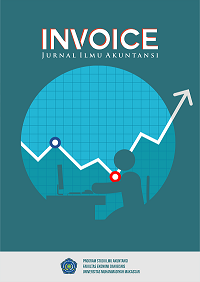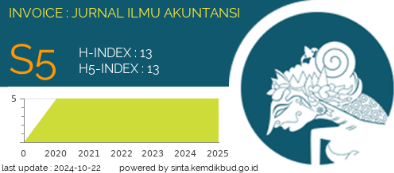The Effect of Musharakah Financing on Profitability at Islamic Commercial Banks in Indonesia
DOI: https://doi.org/10.26618/inv.v6i2.15685
Abstract
This research investigates the effect of musharakah financing on the profitability of Islamic commercial banks in Indonesia over the 2017-2022 period. Musharakah financing, a partnership-based financial instrument in Islamic banking, is analyzed for its impact on the Return on Equity (ROE) ratio, a key profitability indicator. The study employs a quantitative approach, utilizing secondary data from the financial reports of nine Islamic commercial banks, resulting in 54 data points. Simple linear regression analysis, conducted using SPSS version 25, reveals that musharakah financing has a negative effect on profitability. The findings indicate that while musharakah financing is a significant Islamic banking product, it may not necessarily contribute positively to the profitability of these banks. Various factors, including the economic conditions during the study period, might have influenced these results. For instance, Indonesia faced an economic slowdown and high exchange rate fluctuations, which could have impacted the returns from musharakah financing. Additionally, the COVID-19 pandemic further strained economic activities, potentially affecting the banks' financial performance. This study's insights are crucial for Islamic commercial banks to re-evaluate their financing strategies and seek ways to enhance their ROE. Future research could expand the scope by including other Islamic financial products and extending the study period for more comprehensive results.References
Arizah, A., Ayudina, R., Muchran, M., & Arsal, M. (2024). Profit Management and Tax Avoidance in Mining Sector Companies. Owner: Accounting Research & Journal , 8 (1), 455–469.
Arsal, M. (2021). Impact of earnings per share and dividend per share on firm value. ATTESTATIONS , 4 (1), 11–18.
Arsal, M., Amalia, R., Rayyani, WO, & Hasan, HA (2024). Determinants of Income Smoothing: View of Indonesia Stock Exchange. American Journal of Humanities and Social Sciences Research , 08 (01), 146–152. https://www.ajhssr.com/current-issue/
Arsal, M., Haerul, & Khaliq, A. (2022). Musyarakah-Based Business Partnerships for Broiler Chicken Farmers, Are They Compliant with Sharia Principles. Milkiyah Journal of Sharia Economic Law , 1 (2), 65–74.
Arsal, M., Hamid, NIN bt A., Arsal, R., & Basri, M. (2014). Consumer behavior of the Islamic Banking. International Journal of Science Commerce and Humanities , 2 (7), 59–64.
Arsal, M., Ulfah, K., & Muchran, M. (2022). Trust as A Value in Zakat Management Accounting. IMANENCE: Journal of Islamic Economics, Management and Accounting , 7 (2), 13–20.
Central Bureau of Statistics . (2017). Bps.go.id. https://www.bps.go.id/pressrelease/2018/02/05/1519/economic-indonesia-triwulan-iv-2017--tumbuh-5-19-persen.html
Central Bureau of Statistics . (2018). Bps.go.id. https://www.bps.go.id/pressrelease/2019/02/06/1619/economic-indonesia-2018-tumbuh-5-17-persen.html
Diana, N. (2020). Murabahah Financing, Mudharabah Financing, Musyarakah Financing, Profitability. AKUNSIKA: Journal of Accounting and Finance , 1 (1), 76. https://doi.org/10.31963/akunsika.v1i1.1689
Hardianti, Muryani Arsal, & Muchriana Muchran. (2024). the Effect of Profitability, Leverage and Compay Size on Company Value in the Banking Sector That Goes Public in Indonesia Stock Exchange (Idx) Period 2020-2022. Journal of Academic Media (JMA) , 2 (2). https://doi.org/10.62281/v2i2.152
Hidayatullah, MS (2020). Implementation of Cooperation Pattern Agreements in Financial Products in Sharia Banks (Study of Mudharabah and Musyarakah in Sharia Economic Law). Hadratul Madaniyah Journal , 7 (1), 34–41. https://doi.org/10.33084/jhm.v7i1.1613
Maliha, H., & Marlina, L. (2019). Why are Sharia Banks Relatively More Crisis Resistant? Logistic Regression Application for an Early Detection System for Financial Crisis in Indonesia - Siliwangi University Repository. Unsil.ac.id . http://repository.unsil.ac.id/
Marsuni, N. S., & Insirat, M. N. (2021). Analysis of the Effects of Carbon Taxes on Sustainable Business Operations. GoodWill Journal of Economics, Management, and Accounting, 1(2), 43-47.
Marsuni, N. S. (2021). Effective Strategy in Overcoming Challenges in Implementing Carbon Tax Policy. GoodWill Journal of Economics, Management, and Accounting, 1(1), 24-29.
Marsuni, N. S., & Insirat, M. N. Tax Strategy to Encourage MSME Growth: Analysis of Effectiveness and Constraints.
Nataliawati, R. (2019). The influence of the ratio of sharia financing products on return on equity of sharia commercial banks in Indonesia (Doctoral dissertation, Wijaya Kusuma Surabaya University ). https://erepository.uwks.ac.id/4884/2/
Nurulhidayah, Arsal, M., & Amin, ARS (2024). The Influence of Usefulness and Convenience on Interest in Using BNI Syariah Mobile Banking Services with Trust as a Mediating Variable. IJMA) Indonesian Journal of Management and Accounting , 5 (2
Pramono, A., & Nugraha , AD (2019). The effect of market risk on return on equity of musyarakah financing in Indonesian Islamic banking. Journal of Finance and Banking , 23(3), 429-442.
Puriyanti, T., & Mukhibad, H. (2020). Factors That Influence the Quality of Mosque Financial Reports. Journal of Islamic Economics, Finance and Banking , 4 (1). https://doi.org/10.24252/al-mashrafiyah.v4i1.12089
Putri, AH & Diana N (2022). The Effect of Mudharabah and Musyarakah Financing on Profitability. Competitive Journal of Accounting and Finance , 6 (1), 77–82. https://doi.org/10.31000/competitive.v6i1.4383
Roezyandhik, DR (2019). The Influence of Mudharabah, Musyarakah, and Murabahah Financing on Profitability in Sharia Commercial Banks in Indonesia. Unej.ac.id . https://doi.org/150810301080
Sariyah, S., & Yusnida, Y. (2019). The influence of market conditions on the profitability of musyarakah financing at Islamic banking in Indonesia. Journal of Multiparadigm Accounting , 10(2), 280-291.
Wangsawidjaja. A. 2012. Sharia Bank Financing . Jakarta: Gramedia Pustaka Utama
Downloads
Published
Issue
Section
License
Authors who publish with Invoice: Jurnal Ilmu Akuntansi agree to the following terms:
-
Copyright Ownership
The copyright of all articles published in this journal remains with the author(s). However, the authors grant Invoice: Jurnal Ilmu Akuntansi the right of first publication with the work simultaneously licensed under a Creative Commons Attribution 4.0 International License (CC BY 4.0). This license allows others to share, copy, redistribute, adapt, and build upon the work for any purpose, even commercially, as long as proper credit is given to the original author(s) and the source. -
Licensing and Access
Invoice: Jurnal Ilmu Akuntansi provides immediate open access to its content on the principle that making research freely available to the public supports a greater global exchange of knowledge. All published materials are available freely without subscription or payment and can be accessed, downloaded, and reused by any user provided that appropriate attribution is given. -
Permission for Reuse
For uses not covered by the CC BY 4.0 license, such as commercial reprints, translations, or any form of adaptation without clear attribution, users must obtain written permission from the editorial team. Requests for such permissions can be directed to the editorial office at: [invoice@unismuh.ac.id]. -
Plagiarism and Originality
Authors are responsible for the originality of their submissions. All articles are screened for plagiarism using appropriate tools before acceptance. Manuscripts found to contain unoriginal content or infringing materials will be rejected or retracted as per journal policy.














